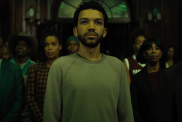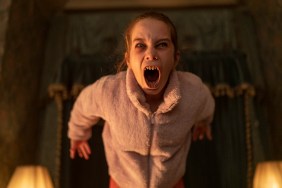
Francois Ozon‘s Jeune et Jolie (Young & Beautiful) begins with a young boy spying on his sister on the beach as she removes her bikini top. It’s a scene that comes off incredibly creepy and strange, especially as it moves forward and he runs down to tell her someone is at the house to see her. However, her level of comfort with the situation and the way the two tease one another and interact, as the first of four parts to this film play out, sets your mind at ease. Their relationship is simply different than what I would call “normal” but the performances from the two actors sells the relationship. Unfortunately, this relationship is not at the heart of the film’s story… at least not in the back-and-forth way it’s initially perceived.
Isabelle (Marine Vacth) is turning 17-years-old this summer and she’s beginning to explore her sexuality. Similarly, her brother, Victor (Fantin Ravat), is curious, but with Isabelle being older their relationship seems to have reached a tipping point where Victor will be playing catch up for many years as Isabelle’s exploration has already begun.
Broken into seasons — separated by four Francois Hardy songs — the film opens with Isabelle and her family on summer vacation and ends shortly after she loses her virginity with a bit of symbolism as she seems to have an out-of-body experience and watches as her childhood disappears into thin air.
As the story moves into the second act, we’re introduced to a far different atmosphere. The young man Isabelle had sex with is forgotten, but it would seem her loss of virginity has left an inexplicable hole in her psyche as she turns to prostitution, the reasoning of which becomes the MacGuffin sought for the film’s duration and yet never found.
Ozon has filled all the gaps when it comes to traditional explanations for Isabelle’s behavior — her family is well off, her mother loves her, she has a good relationship with her brother and though her mother and father are divorced, even the relationship with her father is healthy. So why turn to prostitution?
The film suggests for Isabelle it’s yet another journey in adolescence. She’s attracted to the adventure and exploration of the unknown. It’s not the money or sexual satisfaction. Can such simplicity be reason enough to walk away satisfied? Is it even an answer to, more-or-less, say, “Because”? As a film critic I realize I would be just as quick to criticize some cliched reason for Isabelle’s behavior, but cliche or clandestine, to ask a question and ask the audience to join you on an exploration for the answer only to walk away with nothing isn’t worth it for me.
Playing Isabelle is Marine Vacth and, based on appearance alone, she reminded me of Bella Heathcoate with a touch of Laetitia Casta. Appropriate, I guess, considering her modeling roots. As for her performance, it’s strong and largely captured in her eyes. She doesn’t say much, which, again, leads to the mystery of her motivation, an aspect of the film I obviously had a hard time with.
Johan Leyson plays one of her elder Johns, a married man, and he too is a bit of a mystery as Isabelle fills a void in his life just as he seems to fill one in hers, though not a void in his marriage. What is it?
Jeune et Jolie is a film made up entirely of questions, but questions that come as a result of a story that’s been manipulated so much I don’t feel it allows any answers, and certainly none you can definitively hang your hat on. I simply hate the idea of walking away saying, “I guess it is what it is.”
Had the story encapsulated a true exploration of adolescence and not one trumped up out of necessity, maybe, maybe I could have found a connection, but everything from the odd opening shot of a brother spying on his topless sister to the reformation of an underage prostitute who seems to have merely grown out of whatever it was that was motivating her isn’t interesting to me.
While watching I couldn’t help but draw the comparison to Luis Bunuel‘s Belle de Jour, which explored its protagonist’s desire for prostitution. Ozon’s film doesn’t play with the psychology of his film’s character as much as Bunuel did, but both films do end with scenes that could be interpreted as real or fantasy. Could this be Ozon’s adolescent answer to Bunuel’s film? To look at it that way does add to the intrigue, but the film still left me cold.









